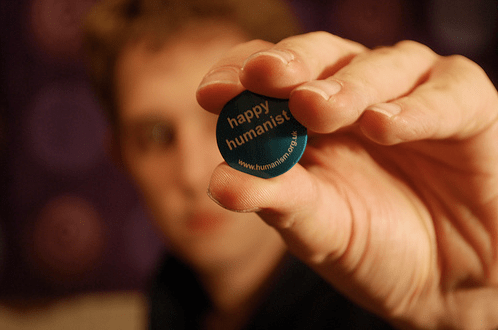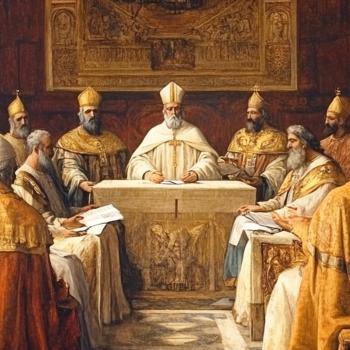By Nick Street - June 22, 2009

One of the fastest-growing cohorts in American religious - identification surveys is also one of the least trusted -- and most misunderstood -- groups in the country.
Meet the "Nones," a loosely aligned grab-bag of humanists, atheists, and spiritual-but-not-religious seekers who typically reply "none of the above" when asked to identify the denomination or tradition that best represents their view of the world.
As a portion of the total U.S. population, the size of the Nones has nearly doubled over the past two decades -- from 8% in 1990 to about 15% today. That number represents a larger constituency than Presbyterians, Methodists, and Episcopalians combined, and in portions of New England and the Pacific northwest, the Nones compose nearly a third of the young-adult population.
Perhaps not surprisingly, this flourishing crop of godless nonconformists has inspired suspicion and even rage among conservative religionists who see their own ranks thinning and their political influence ebbing. Many on the Christian right say they would rather see a gay man or a Mormon in the White House before someone who denies the existence of God.
What's the reason for this animosity? According to Anthony Pinn, a professor of religious studies at Rice University and a pioneering thinker in contemporary African-American humanism, the widespread mistrust of non-theists hinges on the belief that without an authoritarian deity to issue prescriptions for a just life, human beings will inevitably descend into immorality.
Could you say a bit about your religious background?
Anthony Pinn: My extended family was very religious [in the African Methodist Episcopal tradition]. My father didn't attend church, but my mother did, and I was heavily involved for most of my life. I was helping with the service by reading the scripture, leading prayer, and so forth by the time I was 10, and I started preaching in my early teens. But by the start of my Ph.D. program [at Harvard], it was no longer a comfortable fit. I had to bracket portions of the theology in order to continue my ministry. I thought, Perhaps we have God wrong, perhaps we're thinking incorrectly. That was only satisfying for so long.
What aspects of the theology did you find troublesome?
Moral evil and human suffering have been such a problem in the African-American experience, but the "redemptive suffering" response to that problem in our theology just didn't work for me. Anticipating hardship and pain in this life and hoping for salvation in the next seemed far from helpful. I just couldn't be a part of that structure, and humanism started to seem much more appealing.
That's quite a leap from taking issue with a theology of redemptive suffering to embracing humanism. Could you explain the evolution of your thinking in more detail?
It was a transition over seven or eight years, involving a lot of wrestling with the doctrine of God with [Harvard professors] Gordon Kaufman and Richard R. Niebuhr. Ultimately, something about theism started to smell of bad faith. If Gordon Kaufman was right that theology is a human construction, then I began to reason that its subject matter is also a human construction. Let's just be honest about it: this is all about us. Once we acknowledge that it's just us, we need to begin to make something that works rather than waiting on divine assistance that can't come.
How has this shift played out in your own life? Are you a joiner?
I'm a member of the Unitarian Universalist Association -- but that's a fairly recent development. When I was in my previous job at Macalester College, I got a call from The Houston Chronicle, which wanted to do a profile of me. In the interview, I said I'm a humanist, but I teach about and study God and teach religion. I immediately started getting hate mail and nasty phone calls, and some students told me their parents said they shouldn't enroll in my courses. Then a few trustees started to question my fit at Macalester -- though the president, provost, and chair of my department were all supportive. In the midst of all that, I received invitations from UU congregations to come and talk. I wasn't pleased with the UU's overall track record with respect to race, but when I moved to Houston, I joined a UU congregation that has a sense of itself that extends beyond its own walls. I'm not the most active of members, but I'm involved.
What's the focus of your work these days?
I'm engaged in two projects: uncovering African-American humanism as a religious orientation and articulating a non-theistic theology.
On the first score, the few of us who are working on this -- mainly me and William Jones [professor emeritus at Florida State] -- don't have a ready-made grammar or vocabulary at our disposal, so at this point we're basically doing archeological work. The starting points are black folk tales, folk wisdom, and the Blues. James Cone's description of the Blues as secular spiritualism is inappropriate. That's working imperialism on the Blues. The usual line is that all of these folks are critiquing white Christianity. No, they're critiquing Christianity. The Harlem Renaissance just screams of this orientation. It was a community of non-theists.
And second, I'm trying to correct the lazy depiction of theology as god-talk. Theology is a mechanism of analysis -- a way of reading human experience. Theology doesn't require metaphysics; in fact, it works quite well without God. You simply exchange a preoccupation with the divine for a preoccupation with embodiment. Asking what it means to exist in a body that occupies space and time is the starting point for "complex subjectivity" -- an ethical introspection that gets expressed through institutions, doctrines, creeds, and worship activities but that's fundamentally concerned with the development of relationships.
That sounds like the starting point for a humanist ethics.
Exactly. The bias against humanism is based on the warped assumption that one needs belief in some sort of divine thing to be moral and ethical -- that, left to their own devices, humans won't be moral and ethical. But ethics without God isn't nihilism. It's measured realism. We recognize that human beings are capable of great good and great harm, and we try to maximize the former and minimize the latter.
The bottom line is that all we have is each other and this earth. This is all we have, and nothing comes after this. All we can do is to struggle to create greater spaces of freedom. And we struggle not because the outcomes are guaranteed but because that's our last, best option.
Anthony B. Pinn is the Agnes Cullen Arnold Professor of Humanities and Professor of Religious Studies at Rice University. His professional commitments also involve work as the Executive Director of the Society for the Study of Black Religion and co-chair of the American Academy of Religion's Black Theology Group.
His most substantive presentation of his research interests is Terror and Triumph: The Nature of Black Religion (Fortress Press, 2003). In addition to that text, Pinn is also the author/editor of fifteen other books, including Varieties of African American Religious Experience; The Black Church in the Post-Civil Rights Era; Why, Lord?: Suffering and Evil in Black Theology; and African American Humanist Principles: Living and Thinking Like the Children of Nimrod (Palgrave Macmillan) . He is currently working on a book dealing with the aesthetics of black religious experience and a co-edited volume on theoretical and methodological considerations related to the study of religion in popular culture.
1/1/2000 5:00:00 AM




